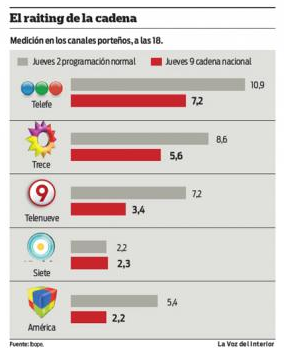Using the national broadcasts (“Cadena Nacional” in Spanish), President Cristina Fernández de Kirchner [es] speaks about new policies, investments, projects and new initiatives incumbent upon the state. In her last presidential address, the President proposed a law for public ethics for the practice of journalism, a proposal which caused numerous reactions from Argentine bloggers and journalists.
National broadcasts
National broadcasts [es] are the coordinated and simultaneous transmission between radio and television channels that broadcast official announcements. In Argentina, Law 26,522, enacted in October 2009, regulates the audiovisual media services. Article 75 [of this law] says:
ARTICULO 75. — Cadena nacional o provincial. El Poder Ejecutivo nacional y los poderes ejecutivos provinciales podrán, en situaciones graves, excepcionales o de trascendencia institucional, disponer la integración de la cadena de radiodifusión nacional o provincial, según el caso, que será obligatoria para todos los licenciatarios.
According to Fabián Bosoer in El Estadista [es], the president’s reason for using this method is to avoid misinformation:
Ante las críticas por el uso y abuso de la Cadena Nacional, Cristina se quejó de la existencia de una “cadena nacional del miedo y el desánimo” que sólo transmite malas noticias y propaga “mala onda”. Esta supuesta campaña negativa obligaría a la Presidenta a difundir los logros y actos de su Gobierno a través de estos discursos y teleconferencias transmitidas por cadena, en las que –según la interpretación oficial– ella se puede comunicar directamente y sin intermediarios con el pueblo televidente.
The newspaper La Voz del Interior [es] published a graph showing the effect that national broadcasts have on the rating of each channel:
El tema es que la aparición de la Presidenta en todos los medios en simultáneo cada vez tiene menos audiencia, según surge de los datos de Ibope, la consultora que mide los ratings de la televisión porteña.
In her last television broadcast, the president spoke of the opening of a hydrotreatment plant of YPF Diesel, and said [es]:
¿Y por qué por cadena nacional? Porque si no lo hiciéramos por cadena nacional nadie se enteraría de esas cosas.
Legislating public ethics?
One issue that has been at the core of the recent controversy is the comment made by the President during the same speech, where she comments that there should be a law that requires journalists to “publish from which companies they receive money […] who pays them, so that when we read an article, we know.”:
Pero la verdad que nosotros necesitamos una ley de ética pública también para ese cuarto poder de una buena vez por todas en la República Argentina. No para no decir nada, al contrario, no, simplemente para manifestar si reciben dinero de alguna empresa o si tienen alguna inclinación política.
A result of this was the “Announcement by FOPEA [Argentine Journalism Forum] on the ethics of journalism in Argentina”:
[…] manifestamos nuestro total desacuerdo con cualquier iniciativa que promueva la regulación de la profesión por medio de leyes o medidas gubernamentales y alertamos sobre los graves riesgos que implica para la libertad de expresión esta clase de planteos o propuestas.
Christian Sanz, director of the independent newspaper Tribuna, [es] questions the president and writes:
Es bien cierto lo que dice la Presidenta respecto a que existen colegas que cobran dinero bajo mesa, pero alguien debería decirle que si conoce algún caso en particular tendría que denunciarlo como corresponde, en el lugar adecuado, no a través de la ostentosa cadena pública nacional.
For his part, Gustavo Marcelo Sala in his blog Las Balas del Campanario [es] analyzes the “public ethic”:
No estoy tan de acuerdo en formalizar una ley de ética pública. La historia de la humanidad nos demuestra cómo ha variado dicho concepto con el correr de los años. ¿Quién determinaría sus incisos? ¿Los dueños de los medios, los editores, los periodistas, los patrocinadores, el Estado, todos juntos? ¿Bajo qué parámetros profesionales y conceptuales? ¿Cuál sería la batería de penalizaciones? ¿Cómo hacemos para deslindar a la subjetividad del asunto?
Gustavo continues:
Aceptaría, pero con reparos, que el propio periodismo establezca una suerte de ética profesional en el marco de su actividad aunque la realidad marca que en la coyuntura sería imposible constituir un cuerpo colegiado de carácter democrático para debatir abiertamente la cuestión. ¿Se puede calificar desde lo ético una determinada interpretación de la realidad? No me parece.
In his article for Perfil, Roberto Garcia [es] suggests the president’s role as virtual managing editor, because of the national broadcasts:
En verdad, esa actividad de virtual jefa de redacción que practica en sus discursos les ha aliviado la faena a los periodistas, ya que les ahorra imaginación y búsqueda informativa: ella sola genera noticias que en otras partes no aparecen, provoca titulares, también editoriales, sus opiniones reemplazan el aburrimiento diario de la anodina información local y hasta de la complicada del orden internacional. Si no fuera por Cristina, los diarios venderían menos ejemplares y los periodistas deberían trabajar más. Merece del gremio un agradecimiento.
In the post “Cristina and National Broadcasts as a sovereign expression“, [es] Cristian Adalberto Sayes in the blog Goliardo [es] analyzes the use of national broadcasts, and ends with a phrase by Juan Donoso Cortés:
La soberanía política se expresa en la palabra presidencial sin medición corporativa. La cadena nacional llega sin medicación. Es una especie de comunicación de democracia directa. Porque, parafraseando al célebre español,
Cuando la noticia basta para informar, la noticia; cuando no basta la cadena nacional.
Political sovereignty is expressed by the presidential word without corporate mediation. National broadcasts arrive unvarnished. It is a kind of direct democracy. Because, paraphrasing the famous Spaniard,
When the news is enough to inform, then the news; when it’s not, then a nationwide address.








2 comments